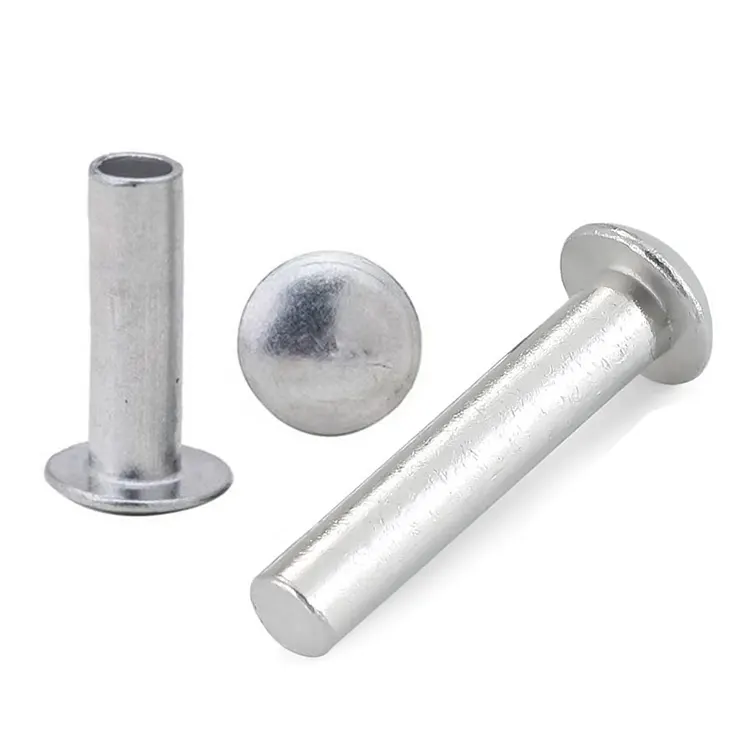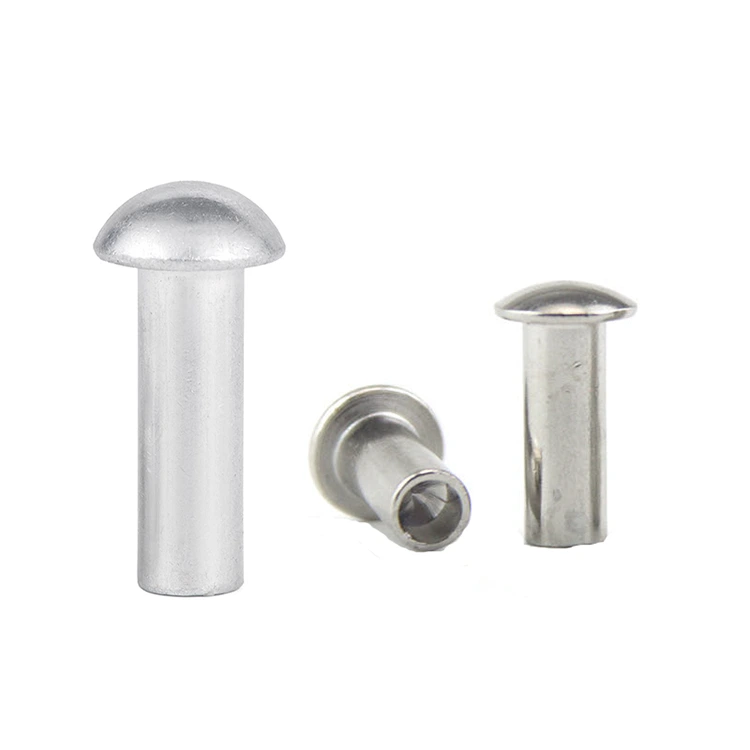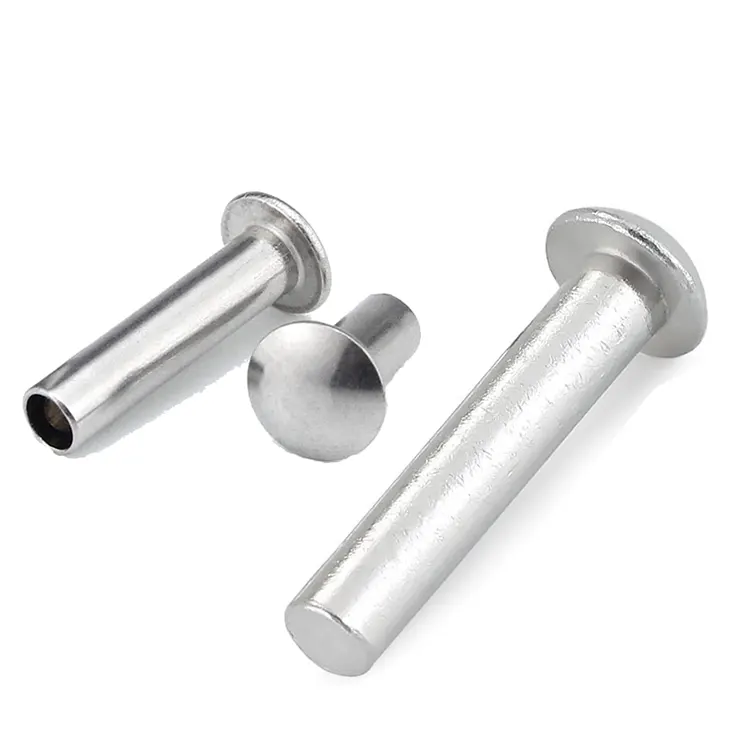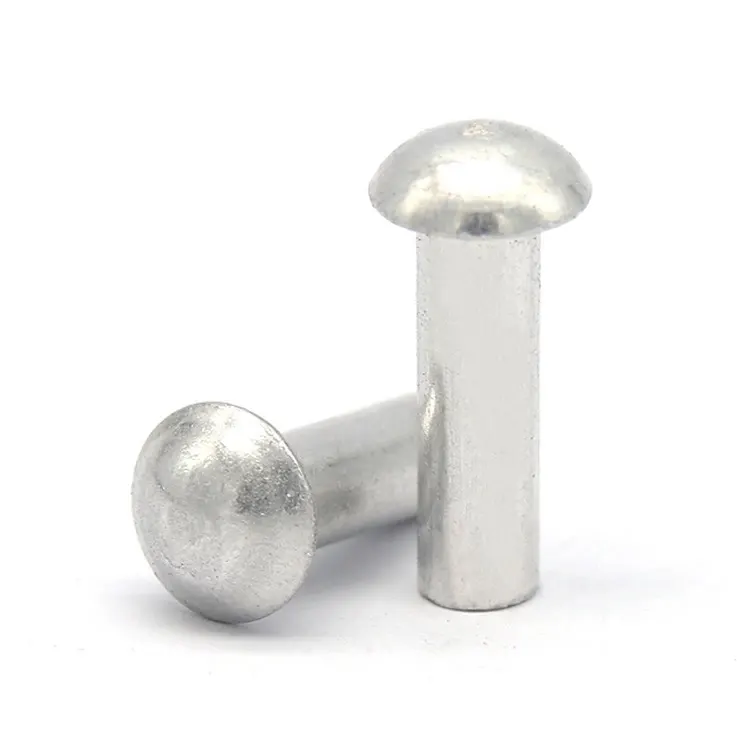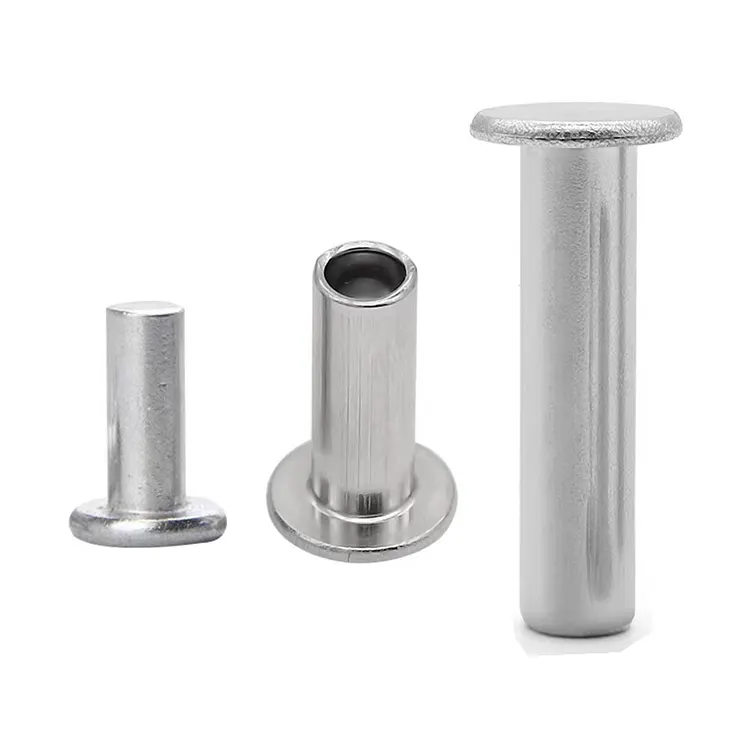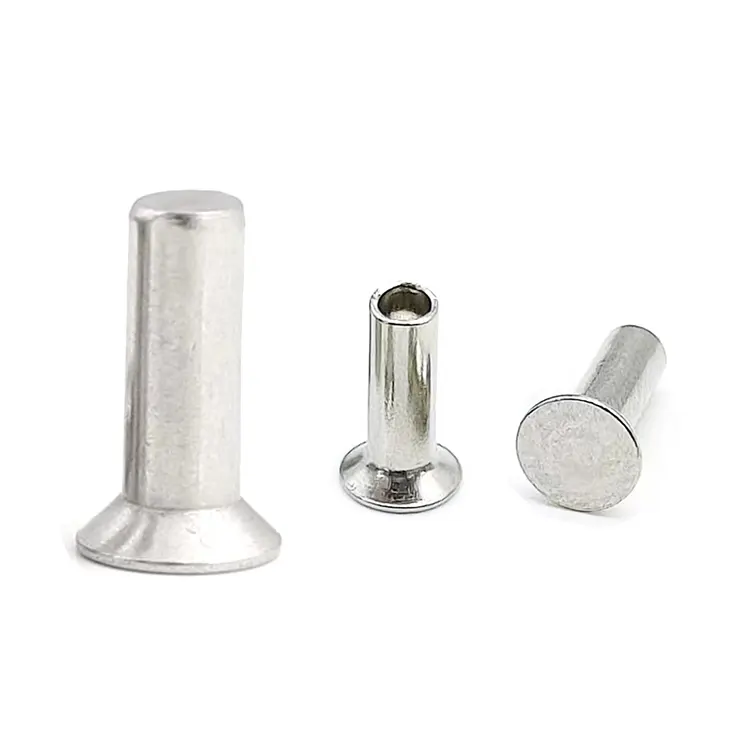Klinknagels
As one of professional manufacturer in China, Notin would like to provide you Rivets. And we will offer you the best after-sale service and timely delivery.
What is a rivet?
A rivet is a permanent mechanical fastener used to join two or more materials. Rivets work by inserting a metal pin into an aligned hole and deforming the end, creating a strong, secure, and durable connection. Unlike temporary fasteners like screws, rivets do not rely on threads, but instead form a permanent connection, making them ideal for applications requiring high strength, durability, and vibration resistance.
Classification of Rivets
Rivets are typically categorized by head shape, degree of hollowness, or material.
Based on head shape, rivets can be classified as flat head rivets, round head rivets, countersunk head rivets, mushroom head rivets, universal head rivets, truss head rivets, etc.

Based on degree of hollowness, rivets can be classified as solid rivets, semi-tubular rivets, or full tubular rivets.
Based on material, rivets can be classified as brass rivets, stainless steel rivets, steel rivets, aluminum rivets, copper rivets, etc.

What surface finishes are available for rivets?
Rivet surfaces are typically treated with rust-proofing treatments, primarily electroplating, including zinc plating, nickel plating, chrome plating, tin plating, gold plating, and silver plating. Electroplating is a common rust-proofing method for rivets. It applies a layer of plating to the rivet surface through physical or chemical methods. The plating effectively prevents corrosion and rust, while also providing a certain aesthetic effect.
Another special surface treatment method is head coating. Head coating is performed after the rivet is electroplated. This allows for a variety of colors on the rivet head, achieving an aesthetically pleasing finish.
Aluminum rivets cannot be electroplated, but they can be anodized. Anodizing also allows for a variety of color options, but the unit price is higher than electroplating.
Rust-proofing the rivet surface is crucial, effectively extending the rivet's service life and ensuring a secure connection. Different rust-proofing methods are suitable for different environments and applications, so the choice should be tailored to the specific situation.
- View as
Aluminium klinknagels met ronde kop
Aluminium klinknagels met ronde kop worden veel gebruikt op verschillende gebieden vanwege hun lichtgewicht, hoge sterkte, corrosieweerstand en uitstekende verbindingseigenschappen. Nuote Metals is een Chinese fabrikant die gespecialiseerd is in de productie van aluminium klinknagels met ronde kop. Onze klinknagels worden wereldwijd geëxporteerd en we heten klanten welkom om ons te bezoeken voor vragen.
Lees verderStuur onderzoekAluminium klinknagels
Aluminium klinknagels worden veel gebruikt in de mechanische productie, de bouw, de automobielsector, de lucht- en ruimtevaart en andere gebieden. Ze zijn gemaakt van massief aluminium en zijn lichtgewicht, corrosiebestendig en gemakkelijk te verwerken. Nuote Metals is een professionele fabrikant van aluminium klinknagels, waaronder massieve en halfholle klinknagels, evenals verschillende kopvormen, zoals platte koppen, koepelvormige koppen en verzonken koppen. Wij bieden een volledig scala aan specificaties en verwelkomen aangepaste bestellingen.
Lees verderStuur onderzoekAluminium pankopklinknagels
Zoals de naam al doet vermoeden, zijn aluminium klinknagels met ronde kop aluminium klinknagels met een panvormige kop. Vergeleken met traditionele klinknagels met platte kop bieden aluminium klinknagels met platte kop een grotere schuifsterkte en weerstand tegen breuk tijdens het klinkproces. Deze klinkmethode wordt vaak gebruikt voor het verbinden van structurele componenten die een hogere beveiliging en veiligheid vereisen, zoals in vliegtuigen en autotoepassingen.
Lees verderStuur onderzoekAluminium paddestoelkopklinknagels
Aluminium paddestoelkopklinknagels spelen, dankzij hun lichtgewicht, corrosiebestendige, esthetisch aantrekkelijke en praktische eigenschappen, een belangrijke rol in tal van toepassingen. Nuote Metals, een Chinese klinknagelfabrikant, is gespecialiseerd in de productie van aluminium paddestoelkopklinknagels. We beschikken over duizenden mallen voor verschillende klinknagelspecificaties en meer dan 40 klinkmachines, die dagelijks tientallen miljoenen klinknagels kunnen produceren. Wij zijn blij met uw vragen.
Lees verderStuur onderzoekAluminium klinknagels met platte kop
Puur aluminium klinknagels met platte kop zijn gemaakt van puur aluminium en zijn licht van gewicht, corrosiebestendig en uitstekende elektrische geleidbaarheid. Ze zijn geschikt voor algemene toepassingen met weinig eisen, zoals meubels, elektrische apparaten en de voertuig- en scheepsbouw. De lage sterkte van puur aluminium maakt het echter ongeschikt voor toepassingen met hoge belasting. Nuote Metals is een toonaangevende fabrikant van aluminium klinknagels met platte kop in China en exporteert onze klinknagels wereldwijd. Wij zijn blij met uw bezoek en vragen.
Lees verderStuur onderzoekAluminium klinknagels met verzonken kop
Aluminium klinknagels met verzonken kop zijn bevestigingsmiddelen die worden gebruikt om twee of meer dunne platen met elkaar te verbinden. Dankzij de verzonken kop kunnen ze na installatie gelijk met het oppervlak liggen, waardoor uitsteeksels worden geminimaliseerd en ze geschikt zijn voor toepassingen die gladde oppervlakken vereisen. Deze klinknagels zijn voornamelijk gemaakt van aluminium en zijn lichtgewicht, corrosiebestendig en zeer geleidend, waardoor ze veel worden gebruikt in industrieën zoals de luchtvaart, de automobielsector, de elektronica en de bouw.
Lees verderStuur onderzoekWhat are the advantages of rivets over other fasteners?
1. Ease of Installation
Rivets are fast to install, and even fully automated for high-volume applications, resulting in a simple and efficient operation process.
2. Connection Reliability
The riveting process is standardized, with strict quality control, resulting in highly stable connections. Visual inspection allows for quick verification of connection quality.
3. Vibration and Impact Resistance
Rivets connect through deformation or interference fit, providing strong clamping force and excellent vibration resistance, capable of withstanding vibration and shock.
4. Low Cost
Rivets are easy to install and can be fully automated, saving significant labor costs.
What are the advantages and disadvantages of rivets made of different materials?
Aluminum Rivets
Advantages: Lightweight, reduces overall product weight, low cost, suitable for general civilian applications.
Disadvantages: Low tensile and shear strength, unsuitable for high-strength workpieces, prone to electrochemical corrosion when in contact with metals such as stainless steel.
Stainless Steel Rivets
Advantages: Strong corrosion resistance, high hardness, suitable for high-strength workpieces (such as marine equipment)
Disadvantages: Higher cost, typically more expensive than aluminum rivets of the same specification.
Brass and Copper Rivets
Advantages: Excellent conductivity (such as connecting electronic components), good corrosion resistance.
Disadvantages: Higher cost, more difficult to process.
Steel Rivets
Advantages: High hardness, high connection reliability, and wide applicability.
Disadvantages: Compared to other materials, iron rivets are more prone to rusting.
What are the main applications of rivets?
Rivets have a wide range of uses, from small items like a pair of scissors to large items like airplanes and ships, as well as in high-precision medical applications.
Industrial Manufacturing
Rivets are used in a wide variety of industrial fields, wherever there is a need to connect two or more materials.
Electronics
Rivets secure heat sinks and chips, providing both vibration damping and noise reduction, and are widely used in the cooling systems of electronic products such as computers and mobile phones.
Automotive
Rivets are widely used to connect components of automobile bodies and chassis, such as doors and hoods. Their lightweight and corrosion-resistant properties make them an indispensable joining method in automotive manufacturing.
Aerospace
In aircraft manufacturing, rivets are used to connect different fuselage components, such as wings and tailplanes. Millions of rivets create high-strength, corrosion-resistant joints. Aluminum and titanium alloy rivets are often used to connect components of corresponding materials, ensuring stability in extreme environments.
Rivets are used everywhere. The above examples only represent a small number of their applications. We see rivets everywhere in our daily lives, such as on scissors, folding beds, and strollers etc. Rivets can be customized to different sizes and materials depending on the application.
Nuote Metals has specialized in the rivet industry for over a decade. Our factory is located in Dongguan, a city known as the "World Factory," a city with a developed industry and convenient transportation. This allows us to respond quickly when acquiring raw materials and supporting surface treatments, meeting our customers' needs for quick access to samples and bulk orders. We produce 10 million rivets daily and have molds of various specifications, allowing us to produce rivets as small as 0.8mm and as large as 10mm. We welcome your inquiries and visits.







